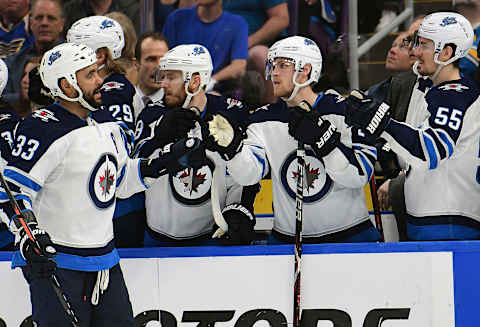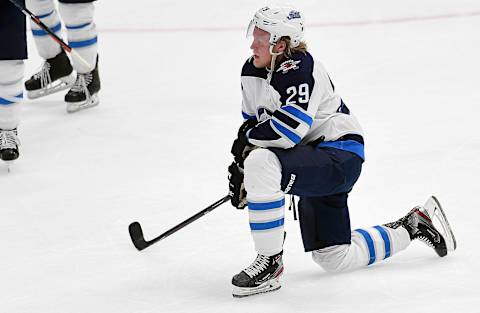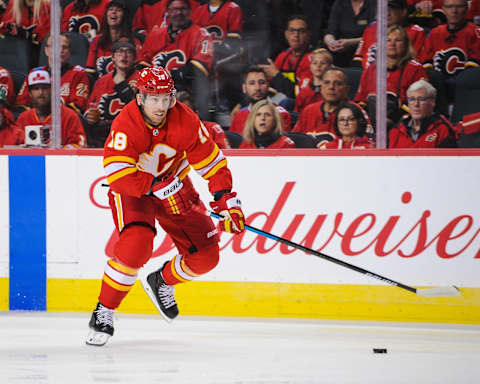New York Rangers: Teams with salary cap issues this summer


With ample cap space this summer, the New York Rangers could look to take advantage of other teams in a more dire situation.
One of the side effects of rebuilding a team’s roster is having the flexibility to make the luxury of choices. The New York Rangers sit with around $20 million in cap space going into this summer and have the opportunity to make moves this summer. Once the team gets its own house in order in terms of restricted free agents, it could stand to use its cap space to gain more assets.
Whether or not the team tries to accumulate more assets will come down to if the front office views the team as ready to compete next season. While that may seem a bit premature, adding the second overall pick and Vitali Kravtsov to the Rangers’ top six could move the team’s timeline up.
However, if the executives feel that the team is still a year away from competing, there is room on the books to take on a bad contract or two to acquire future assets. Although rarer in the NHL, salary dumping is commonplace in the NBA and a useful tool for teams caught in a bind up against the cap.
In the case of these following teams, they’re caught in such a rough salary situation that the Rangers may be able to trade for a quality player and help the rebuild all in one fell swoop.

Winnipeg Jets
Available cap space: $33,340,000
Number of UFAs: 7
Number of RFAs: 7
Key RFA extension: Patrick Laine, Kyle Connor, Jacob Trouba
While the ever-increasing NHL salary cap does help the Winnipeg Jets try and keep the band together, things are going to hit a wall this summer. The cap situation up in Manitoba is so dire that the team isn’t expected to even make an offer to former Ranger Kevin Hayes this summer as an unrestricted free agent.
The team’s major decisions will be the future of both Patrick Laine and Kyler Connor. The two wingers combined for 64 goals this past season, but the Laine situation is the far more complicated of the two. The Finn had 18 goals in the month of November alone, but only picked up 12 the rest of the season.
The Jets will need to make a determination about whether the restricted free agents are deserving of bridge deals or long-term extensions. From there, the rest of the team can begin to take shape. However, with 14 roster players from this past season no longer under contract, the Jets need players to fill out the lineup.
Signing Laine and Connor will take priority, yet the future around defenseman Jacob Trouba is somehow the most up in the air. The Jets’ blueline is clogged with upper echelon talent and it’s forced Trouba further down the depth chart. In fact, the Michigan native held out the start of the 2017-2018 season and demanded a trade or big extension.
Ultimately, the two made up and Trouba played the last year without complaint. But, it seems as if Trouba is already on his way out the door and alluded that it wasn’t his job to take less money to make the team better this upcoming summer.

Edmonton Oilers
Estimated cap space: Roughly $17 million
Number of unrestricted free agents: 3
Number of restricted free agents: 4
Key free agents: Apparently Tobias Reider?
The Edmonton Oilers do not have any key free agents that are going to put them up against the cap ceiling. However, the main issue up in Alberta is the return on value that the team is paying. Somehow, the Oilers only had $356,000 of cap space this past year even though the team is amongst the least talented in the entire league.
Premium contracts paid out to players like Milan Lucic, Andrej Sekera and a lack of willingness to let talent develop has put the team in dire straits. The Oilers had two players, Connor McDavid and Leon Draisatil hit the 100 point mark, but aside from those two, there was little to be happy about.
The Rangers could look to take advantage of Edmonton’s crunch and acquire a future asset like a draft pick in return for taking on a short-term contract that’s an overpay. This leaves Lucic out of the question unless the Oilers were really willing to load up the package with enough sweeteners to put Jeff Gorton into diabetic shock.

Calgary Flames
Estimated cap space: $16 million
Number of UFAs: 4
Number of RFAs: 5
Key free agents: Sam Bennet, Matthew Tkachuk (Both RFA)
While the Calgary Flames likely didn’t expect to spiral out of the first round of the playoffs in such an anti-climactic way, the organization is set up pretty well for the future. Built around young stars like Johnny Gaudreau that are on team friendly long term deals, the team is in both decent shape in terms of talent and financial health.
There two restricted free agents, Sam Bennet and Matthew Tkachuk who are impact players. Both are likely to get locked up long-term now and be paid up front. While losing the bargaining power is less than ideal from the player perspective, it’s worth the tradeoff when considering the long term financial security.
The Rangers could look to take on a bad contract from the Flames to acquire future assets. While the James Neal contract is amongst the worst in the entire league because it still has four more years at a premium cost, for the right price, it’d be worth the Rangers eating the hit.
There’d likely have to be salary retained, but if the team is committed to a slow burn rebuild, putting Neal in the bottom six while the prospects develop would not be the worst thing in the world. It should be mentioned that the 31-year-old underwent major facial reconstruction surgery after getting several teeth knocked out early in the season and he wasn’t the same after returning.
Maybe Neal a year or so removed from the surgery will be more comfortable on the ice and be a serviceable player for a rebuilding Rangers team.

Tampa Bay Lightning
Estimated cap space: Roughly $13 million
Number of UFAs: 4
Number of RFAs: 4
Key free agents: Brayden Point (RFA), Anton Stralman (UFA)
The cost of being the greatest team in the history of the salary cap era is finally catching up to the Tampa Bay Lightning. What made the roster so deep was talent being paid below market value on entry-level contracts. Now, the veteran team has a major contributor, Brayden Point, in need of a long-term extension.
With eight roster players from this year’s team in need of new contracts or a replacement, Tampa Bay’s front office is going to have to really tighten the belt. While the team does boast a talented farm system, the blue line has four players on contracts that expire come July 1st. At the very least, Tampa will need to find replacements.
The main concern, however, will be Point. Coming off of a 92 point season as a 22-year-old, he should be considered a foundational building block. The pay raise that Point will get from his entry-level contract to this first extension should be exponential. The Alberta native will likely get north of $8.5 million per season which severely limits the team’s cap space going forward.
The Rangers could absorb a bad deal like Ryan Callahan’s which is in its final season in return for an asset or roster player. The team will need players to fill out the bottom six and lead a young core and New York could do worse than Callahan.
Next. The retread coaching machine continues. dark
While New York has the luxury of options this summer it needs to carefully shape the plan around the goal. If the front office still thinks the team is a year away or misses out on a marquee free agent this summer, the Rangers could do worse than picking up some bad contracts for assets.